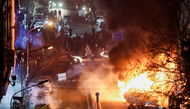▶ By Son Key-young
To lay the groundwork for Clinton’s historic trip, Secretary of State Madeleine Albright will first visit North Korea in the near future, it said. A Foreign Affairs-Trade Ministry official forecast that her visit to the North Korean capital is “a matter of weeks.”
“Secretary of State Madeleine Albright agreed to visit the Democratic People’s Republic of Korea in the near future to directly convey President Bill Clinton’s opinions to Chairman Kim Jong-il of the DPRK National Defense Commission and prepare for the U.S. president’s trip,” the communique reads.
With regard to when Clinton would visit Pyongyang, the ministry official stressed that the two sides should first produce a wide range of agreements on pending issues, including the North’s missile program, during Albright’s trip.
The statement followed two days of talks in Washington between North Korean envoy Jo Myong-nok, first deputy chairman of the National Defense Commission, and top U.S. officials, including Secretary Albright and Defense Secretary William Cohen. Jo also paid a courtesy call on President Clinton to deliver Chairman Kim’s letter to him.
Wrapping up a four-day stay in the United States from Oct. 9, the North Korean delegation left Washington, Oct. 12.
However, the joint communique failed to mention whether Washington would drop Pyongyang from the list of state sponsors of terrorism and deliberate on the exchange of diplomatic representatives.
Citing the joint statement issued on Oct. 6, the two sides only agreed to support international efforts to oppose terrorism.
Officials here view that, prior to Albright’s trip to Pyongyang, North Korea is likely to deport Japanese Red Army terrorists, which is the last condition for the U.S. removal of North Korea from the terrorist list. Then, Albright might bring a “gift” to Pyongyang by announcing that North Korea would be taken off the terrorist list.
With regard to diplomatic representation, the two sides noted that it would be beneficial to maintain diplomatic contacts through bilateral and multilateral channels, reaffirming the principle of non-interference in each other’s sovereignty.
The two sides agreed to work towards finding ways to formally end the 1950-53 Korean War armistice pact with a peace treaty, it said. In this regard, four-party peace talks are one of the viable means to replace the Korean Armistice Agreement, signed after the war, with “stable structures to guarantee peace.” First convened in 1997, the four-party talks, involving the two Koreas, the United States and China, have remained suspended for more than a year.
스마터리빙
more [ 건강]
[ 건강]이제 혈관 건강도 챙기자!
[현대해운]우리 눈에 보이지 않기 때문에 혈관 건강을 챙기는 것은 결코 쉽지 않은데요. 여러분은 혈관 건강을 유지하기 위해 어떤 노력을 하시나요?
 [ 건강]
[ 건강]내 몸이 건강해지는 과일궁합
 [ 라이프]
[ 라이프]벌레야 물럿거라! 천연 해충제 만들기
 [ 건강]
[ 건강]혈압 낮추는데 좋은 식품
[현대해운]혈관 건강은 주로 노화가 진행되면서 지켜야 할 문제라고 인식되어 왔습니다. 최근 생활 패턴과 식생활의 변화로 혈관의 노화 진행이 빨라지고
사람·사람들
more
인터뷰-한국어진흥재단… “한국어 확대 체계적으로”
차세대 한국어 및 한국문화 교육을 목표로 활동해 온 한국어진흥재단이 2026년 제16기 이사회에서 유니스 이 이사를 신임 이사장으로 선출하며 …

캘리포니아 태권도협회 이취임식
캘리포니아 태권도협회(CTU) 신년회 및 회장 이·취임식 행사가 지난 10일 오렌지카운티 한인회관에서 열렸다. 이날 행사에서는 용호재 관장이 …
1945년 해방둥이 모임 신년모임
올해로 창립 11주년을 맞은 1945년생 해방둥이 모임(회장 최용자)은 지난 10일 해피 노래교실에서 신년모임을 열고 회원 간 친목을 다졌다.…
전남대 남가주 동문회 신년회
전남대 남가주 총동문회(회장 차흥주)는 지난 10일 아리수 식당에서 동문과 가족들이 참석한 가운데 2026년 신년회를 개최했다. 이날 참석자들…
도산사업회 신년하례식 26일 아로마센터 5층
미주 도산안창호기념사업회(회장 데이빗 곽)는 오는 26일(월) 오후 5시30분 LA 한인타운 아로마센터 5층 더원 뱅큇홀에서 ‘2026 신년하…
많이 본 기사
- 尹 체포방해 1심 징역 5년… “일신·사익 위해 경호처 사병화”
- 미네소타 시위에 ‘내란법’ 꺼내든 트럼프… ‘군 투입되나’ 긴장↑
- 항모보다 비싼 ‘트럼프급 전함’ 건조비용…220억 달러 전망
- 靑 “이혜훈, 野서 5번 공천에 3번 의원…우리가 쓰겠다니 비판”
- 대만, 美관세협상 긍정 평가… ‘5천억불’ 투자액은 쟁점 가능성
- 트럼프, 새 건강보험 개혁안 발표… … 3
- 트럼프 “건강보험사 대신 개인에 보조금 지급”
- 결혼 앞둔 한국인 남성 태국 열차 사고로 참변
- 국립공원 방문시 시민권·영주권 확인한다
- 미네소타서 또… 이민단속 저항 남성 총맞아, 시위 격화
- <정태문의 팝송산책>
- 살림으로 뿌리내리다- 테이크루트 안미정 대표의 요리 이야기 (10)
- 캔디스 조 커미셔너 가주 민권위원 지명
- 오클랜드 시청서 ‘미주 한인의 날’ 선포식 개최
- KP 플라자 마켓 유병주 대표
- 주류사회에 한국 설 전통문화 알린다
- 치명적 독버섯 ‘데스캡’ 확산 비상
- 동포청 서울 이전 계획 인천시 반발에 ‘보류’
- LA 올림픽 티켓 예약 열기 첫날부터 ‘후끈’
- 타운 ‘팟홀’ 379개… “신고해야 신속 복구”
- 한국 ‘여권 파워’ 6년 연속 최상위권
- 인터뷰-한국어진흥재단… “한국어 확대 체계적으로”
- 재미한국학교협의회
- ISS 우주비행사 4명 지구 안착… 건강문제로 조기 귀환
- 캘리포니아 태권도협회 이취임식
- 남가주한국학원 글짓기 대회 시상식
- 서울대 국제하계강좌 수강생 모집
- 이란 공격 보류… 항모전단은 중동으로
- 정부 비판 취재 겁주나 FBI, WP 기자 압수수색
- [부고] 최영희씨 별세, 24일 추모예배
- 강정희 작가 개인전
- 한미수교 100주년 기념 조형물 재설치 가능성 보인다
- ‘그린란드 담판’ 깨졌다… 덴마크·나토군 병력 급파
- ‘딕테’작가, 테레사 학경 차 회고전 열린다
- 호주오픈 18일 개막… 알카라스 vs 신네르 결승서 만날까
- 1945년 해방둥이 모임 신년모임
- [부고] 이복님씨 별세, 22일 장례식
- 안보리서 美·이란 충돌… “모든 선택지 고려” vs “美 소요 개입”
- 임시대통령 로드리게스 vs 트럼프 만난 마차도…혼란의 베네수 실권 다툼
- 미, 그린란드 사려면 얼마 줘야하나?
- 스포티파이 요금 인상 월 12.99달러, 1달러↑
- KAPAC “공공외교로 한반도 평화 이끌어내겠다”
- 댈러스 ‘수퍼신인’ 플래그도 ‘부상병동’에
- “이란 공격시 정권붕괴 대신 분쟁 확산”…美당국, 트럼프에 보고
- 테슬라, 자율주행 소프트웨어 구독제
- [건강포커스] “GLP-1·DPP-4 계열 당뇨병 치료제, 치매 위험 낮춰”
- [전익환 프로의 골프교실] 손목 사용
- 금리 하락에 전국 주택거래 회복세
- “전국 경제활동 개선 소비는 양극화 뚜렷”
- 신차 가격 고공행진… ‘100개월 할부’까지 등장
1/5지식톡

-
 한국 안경을 무료 배송으로 받아보실…
0
한국 안경을 무료 배송으로 받아보실…
0안녕하세요. 서울 안암동에 위치한 ‘보고싶다 안경원’입니다.저희는 다년간 한국 고객분들께 착용감 좋은 안경테와 한국안경브랜드,고압축 도수 렌즈를 합리적인 가격에 제공해온 안경 전문점입니다.이번에 해외 배송이 가능해…
-
 미 육군 사관학교 West Poin…
0
미 육군 사관학교 West Poin…
0https://youtu.be/SxD8cEhNV6Q연락처:wpkapca@gmail.comJohn Choi: 714-716-6414West Point 합격증을 받으셨나요?미 육군사관학교 West Point 학부모 모…
-
 ☝️해외에서도 가능한 한국어 선생님…
0
☝️해외에서도 가능한 한국어 선생님…
0이 영상 하나면 충분합니다!♥️상담신청문의♥️☝️ 문의 폭주로 '선착순 상담'만 진행합니다.☎️ : 02-6213-9094✨카카오톡ID : @GOODEDU77 (@골뱅이 꼭 붙여주셔야합니다…
-
 테슬라 자동차 시트커버 장착
0
테슬라 자동차 시트커버 장착
0테슬라 시트커버, 사놓고 아직 못 씌우셨죠?장착이 생각보다 쉽지 않습니다.20년 경력 전문가에게 맡기세요 — 깔끔하고 딱 맞게 장착해드립니다!장착비용:앞좌석: $40뒷좌석: $60앞·뒷좌석 …
-
 식당용 부탄가스
0
식당용 부탄가스
0식당용 부탄가스 홀세일 합니다 로스앤젤레스 다운타운 픽업 가능 안녕 하세요?강아지 & 고양이 모든 애완동물 / 반려동물 식품 & 모든 애완동물/반려동물 관련 제품들 전문적으로 홀세일/취급하는 회사 입니다 100% …
케이타운 1번가
오피니언

한인 2세들 ‘족쇄’ 국적법 신속 개정해야

노동법 준수로 공정의 새해 열자
 조지 F·윌 워싱턴포스트 칼럼니스트
조지 F·윌 워싱턴포스트 칼럼니스트 [조지 F. 윌 칼럼] 올 중간선거를 덜 불쾌하게 만드는 길
 최규성 삼성서울병원 이식외과 교수
최규성 삼성서울병원 이식외과 교수 [로터리] ‘토의 간’
 전병두 서북미수필가협회 회원
전병두 서북미수필가협회 회원 [금요단상] 꿀벌과의 인연
 심상용 / 서울대 미술관장
심상용 / 서울대 미술관장 [미술 다시보기] 모네와 연작의 경제학
 김정곤 / 서울경제 논설위원
김정곤 / 서울경제 논설위원 [만화경] 애플·구글 ‘적과의 동침’
 한 영 재미수필가협회 회장
한 영 재미수필가협회 회장 [한영의 독서칼럼] 햇살을 향해 헤엄치기
 이규민 한식진흥원 이사장
이규민 한식진흥원 이사장 [로터리] 시간을 담그는 문화, 한국의 장
1/3지사별 뉴스

뉴욕한인회‘제123주년 미주한인의 날’ 기념식 성황
뉴욕한인회(회장 이명석)가 13일 맨하탄 뉴욕한인회관에서 개최한‘제123주년 미주한인의 날’ 기념 행사가 각계에서 활동 중인 1.5세 및 2세…
국적이탈 수속에 2년이나 걸리다니⋯

연방의회서 “한인 위상·한미동맹 제고” 한목소리
한인 이민자들이 미국에 도착한 123주년을 기념하고 한인들의 미국 사회에의 기여를 알리는 ‘제 21회 미주 한인의 날’ 행사가 13일 연방의회…
한국학교 방향성 재정립 모색

한미수교 100주년 기념 조형물 재설치 가능성 보인다
샌프란시스코 공원에 설치되어 있다 철거되어 창고에 보관중인 한미수교 100주년 기념 조형물이 다시 설치될 가능성이 열렸다.한국 국회 재정경제기…
재미한국학교협의회



















































.png)


댓글 안에 당신의 성숙함도 담아 주세요.
'오늘의 한마디'는 기사에 대하여 자신의 생각을 말하고 남의 생각을 들으며 서로 다양한 의견을 나누는 공간입니다. 그러나 간혹 불건전한 내용을 올리시는 분들이 계셔서 건전한 인터넷문화 정착을 위해 아래와 같은 운영원칙을 적용합니다.
자체 모니터링을 통해 아래에 해당하는 내용이 포함된 댓글이 발견되면 예고없이 삭제 조치를 하겠습니다.
불건전한 댓글을 올리거나, 이름에 비속어 및 상대방의 불쾌감을 주는 단어를 사용, 유명인 또는 특정 일반인을 사칭하는 경우 이용에 대한 차단 제재를 받을 수 있습니다. 차단될 경우, 일주일간 댓글을 달수 없게 됩니다.
명예훼손, 개인정보 유출, 욕설 등 법률에 위반되는 댓글은 관계 법령에 의거 민형사상 처벌을 받을 수 있으니 이용에 주의를 부탁드립니다.
Close
x